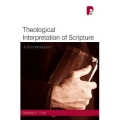 Fowl, Stephen E., Theological Interpretation of Scripture: A Short Introduction (Milton Keynes, Paternoster, 2009).
Fowl, Stephen E., Theological Interpretation of Scripture: A Short Introduction (Milton Keynes, Paternoster, 2009).
Stephen Fowl describes his little book as a ‘companion’ to the theological interpretation of Scripture with the twin tasks of first, exploring some ‘connections between this long-running and essential Christian practice’ and more recent scholarship around the issue, and second, to help readers navigate their way through the contemporary literature (x). The first of five chapters lays the foundation by providing a short description of the nature and role of Scripture in God’s drama of salvation. Fowl finds that christological approaches to the nature of Scripture disconnect theological construction from the interpretation of Scripture, and so suggests a new model of understanding the nature of Scripture is required. He adopts John Webster’s approach of locating Scripture within the triune economy so that for Christians, ‘the ends of reading, interpreting, and embodying Scripture are determined decisively by the ends of God’s self revelation, which are directed towards drawing humans into ever-deeper communion with the triune God and each other’ (6-7).
The second chapter locates theological interpretation with respect to other concerns including history and historical criticism, biblical theology, reading the Old Testament as Christian Scripture, and philosophical hermeneutics. The key issue in all these discussions is the insistence that the Bible is church’s book with the result that theological concerns and ends are primary to all others. Theology is not merely the result of biblical study but plays a regulative function in the hermeneutical process. In his treatment of the question of history and historical criticism, for example, Fowl contrasts modern and pre-modern modes of biblical study. Whereas the latter was ordered toward ‘helping Christians achieve their proper end in God,’ modern biblical study grants priority to historical rather than theological concerns (16). Rather than viewing Scripture as providing a true interpretation of reality, Scripture is now read and interpreted in light of what we know of the so-called ‘real world.’ This reversal of the relationship between text and world not only requires historical criticism but pushes theological concerns to the margins (18-20). Fowl would not banish historical criticism but would see its hegemony in biblical studies overthrown. Historical study remains valid and important, nevertheless ‘granting theological concerns priority will involve a return to the practice of using Scripture as a way of ordering and comprehending the world rather than using the world as a way of comprehending Scripture’ (23). So, too, Fowl would displace authorial intent from a position of primacy in biblical interpretation, suggesting that Christians will want to read texts such as Isaiah 7:14 in the light of Christ, and John 1 in the light of Nicaea, the communicative intent of the prophet and apostle notwithstanding (49). In a telling comment Fowl insists that
Rather than rely on hermeneutics to combat interpretive anarchy and sinful interpretation, believers should seek to regulate these tendencies ecclesially. In short, we should not ask philosophy to do the church’s work (51).
The third chapter identifies several key practices and habits of theological interpretation. Here Fowl suggests believers attend to pre-modern modes of interpretation, especially those where the interpretations issued in ‘masterful performances’ whereby the saints were drawn into ever deeper communion with God and neighbour (54-56). He also argues for ‘figural’ readings of the text, where ‘literal’ readings may not provide a sharp enough vision to account for the world in which we live. Note, however, that Fowl’s description of a ‘literal’ reading of Scripture is “the meanings conventionally ascribed to a passage by Christian communities” (56-57). The final set of practices are not so much practices of interpretation as practices to help the Christian community as it actually interprets Scripture and so inevitably finds itself confronted with different interpretations and the threat of division. These practices include truth seeking and telling, repentance, forgiveness and reconciliation, and finally, patience, both toward one another in the community, and toward God, in confidence that God will ultimately bring the community to its ultimate end in Christ (64-70).
The final two chapters survey issues and prospects for the future, and provide an annotated bibliography that considers some of the key scholars and contributions to the somewhat ‘chaotic party’ that makes up the present interest in theological interpretation. Perhaps the most interesting points here are Fowl’s call for a great deal more cross-fertilisation and robust argument between theologians and biblical scholars, as well as more reflection on how the sermon might become a mode for serious theological interpretation of Scripture (72-73).
This is indeed a short introduction to theological interpretation of Scripture, and perhaps, in the end, too short, especially for a beginner. Those seeking to be inducted into the methodology and practices of theological interpretation would be better directed to a lengthier treatment of the topic such as Dan Trier’s Introducing Theological Interpretation of Scripture (Baker, 2008).
Nevertheless it would be uncharitable to hold Fowl accountable for what he has clearly not attempted to do. His little book effectively argues for the validity of theological interpretation if one can accept his primary presupposition that Scripture is divinely given to lead God’s people more deeply into communion with the triune God and with one another. Further, it provides the essential orientation and ethos of theological interpretation, as well as giving a number of examples of theological interpretation at work; and all this in so short a book! An added bonus is that Fowl is bound to upset scholars all over the theological playing field. Some will cry, “off-side” because of his regulative principle, others because he displaces the author, others because he de-centres historical criticism, others because he values pre-critical modes of biblical interpretation. For me, this is a strength of the work, for he is clearly not beholden to any one school of thought. Further, his regulative principle is left quite broad, intentionally I suspect, so that reading communities of different persuasion will find that they can practise theological interpretation within the promise and bounds of their various traditions and convictions.
For myself, I welcome the book and resonate with the approach. I hope especially that pastors and elders might stumble upon this work and begin leading their congregations in the kinds of practices Fowl commends. Perhaps more congregations might then so read Scripture, that new and renewed communities of saints would again be found who faithfully and fruitfully embody the theological vision of the Bible, as they live more deeply in communion with God, with one another, and with all their neighbours.
Thanks for stirring the pot! The discussion has been active for several years. An overview of three key contributors (including Fowl) is given in S.A. Cummins, ‘The Theological Interpretation of Scripture: Recent Contributions by Stephen E. Fowl, Christopher R. Seitz and Francis Watson’, Current in Biblical Research 2 (2004): 179-96. Fowl is also a contributor to A.K.M. Adam, et al., Reading Scripture with the Church: Toward a Hermeneutic for Theological Interpretation (Grand Rapids: Baker, 2006) [Vanhoozer contributes an article, “Four theological faces of biblical interpretation” which includes the perspective that “the true interpretation of the text is best approximated by a diversity of particular methods, reading contexts and within different communities of interpretation” (p. 141).
Perhaps the most comprehensive introduction to the rapid growth in discussion on reading the Bible in and for the Church is Daniel J. Treier, Introducing Theological Interpretation of Scripture: Recovering a Christian Practice (Grand Rapids: Baker, 2008). He comments on pp. 135-136:
“The obvious question that all these options raise, of course, is whether there should be a definitive context or set of contexts for biblical interpretation, and, if so, what that might be. The history of hermeneutical variety manifests different ways of emphasizing or coordinating the author, the text, and/or the reader. A related hermeneutical triad concerns the historical, literary, and philosophical or theological methodologies mentioned in the previous chapter on biblical theology. Emphasis on the author tends to privilege historical (and grammatical) methods; focus on the text usually fits with the prioritizing literary methods. Those who pursue theological interpretation of Scripture must give attention to what should be the proper role of the reader, yet they do not necessarily have to adopt reader-response hermeneutics. For, instead, theological hermeneutics involves thinking about the nature and nurture of interpretation in light of God, whose action puts reader, text, and author in a larger context that decisively alters the character of their interaction.”
Thanks, John, for these extra references. I have only recently begun some exploration in the area, and find it very interesting. I don’t think authorial and historical concerns can be marginalised, yet the myriad possible interpretations of passages suggests that some overarching framework is necessary if we want to maintain a ‘canon.’ What was provocative in Fowl’s little book is his blunt assertion of the regulative principle.
Another reference worth looking at is “The ‘Plainly Revealed’ Word of God?” – a collection of papers from a symposium on Baptist hermeneutics. The paper by Mikael Parsons traces Baptist interpretation of the book of Acts over several centuries and finds that the rise of historical criticism has decisively influenced the way Baptist ministers preach the book. Much less immediacy…